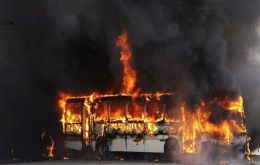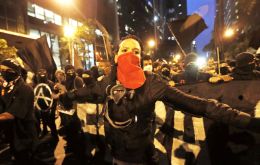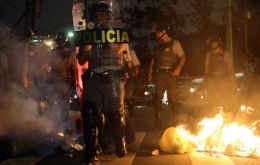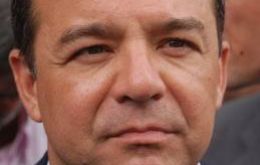MercoPress. South Atlantic News Agency
Tag: Rio do Janeiro riots
-
Monday, April 21st 2014 - 07:38 UTC
Killings and riots in Rio do Janeiro; Army patrolled Bahía can't control crime

Hooded youngsters blocked one of Rio do Janeiro's main highways connecting with neighboring Niteroi and set on fire several buses and vehicles to protest the killing of two youths during weekend police operations in the shanty town (favela) of Caramujo. To the north in Salvador-Bahía, Brazilian army patrolling is unable to control crime.
-
Sunday, January 26th 2014 - 04:15 UTC
Brazil: Hundreds protest against the World Cup

Waving flags, carrying banners and chanting “there will be no Cup” at least 1,000 demonstrators protested in Sao Paulo on Saturday against the World Cup that Brazil will host later this year in a demonstration that devolved into violence late in the night.
-
Thursday, October 31st 2013 - 17:52 UTC
Brazilian government trying to establish dialogue with anarchist group “Black Bloc”

The Brazilian government is trying to establish a dialogue with the anarchist group identifies as “Black Bloc” which has been made responsible by the police for the outbreak of violence and vandalism in the ongoing protests in the country, said the Executive Office Secretary General Gilberto Carvalho.
-
Wednesday, October 16th 2013 - 08:14 UTC
Clashes with police in Brazil’s main cities in support of striking teachers

Protesters have clashed with the police in Brazil's largest cities, Rio de Janeiro and Sao Paulo, after marches in support of striking teachers. Soon after a peaceful march by more than 5,000 people ended in Rio, a much smaller masked group attacked shops, set fire to a police car and threw petrol bombs.
-
Tuesday, July 23rd 2013 - 07:48 UTC
Violent protests against Rio do Janeiro governor following Pope’s reception

Rio de Janeiro was the stage for violent protests centred at Palacio Guanabara where earlier in the day Pope Francis had been received by Brazilian president Dilma Rousseff. The incidents occurred Monday night during a demonstration against Rio state governor Sergio Cabral which convened an estimated 1.500 people according to the police.
